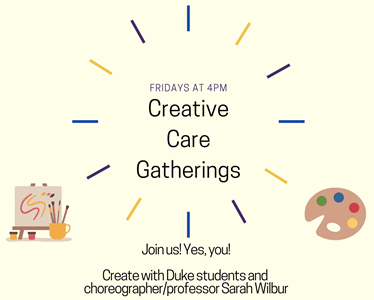Time Slipping Away for Creative Engagement
 As we approach the last few weeks of the Spring 2021 semester, I can feel my time as a program support assistant for Dementia Inclusive Durham (DID) and TimeSlips slip away — in a way. While there is more to look forward to with these organizations, including continued volunteering sessions, as I approach the end of my undergrad and first-year Master’s year at Duke, I can see both an end of the road for the COVID-19 pandemic with ongoing vaccination deployment, as well as for my time in Durham with DID and TimeSlips.
As we approach the last few weeks of the Spring 2021 semester, I can feel my time as a program support assistant for Dementia Inclusive Durham (DID) and TimeSlips slip away — in a way. While there is more to look forward to with these organizations, including continued volunteering sessions, as I approach the end of my undergrad and first-year Master’s year at Duke, I can see both an end of the road for the COVID-19 pandemic with ongoing vaccination deployment, as well as for my time in Durham with DID and TimeSlips.
Looking back, I have fond memories of watching time slip away in my interactions with DID site leads and staff, TimeSlips staff and collaborators, peers, and elders. In building relationships with individuals over a Zoom screen or phone line over open-ended, “beautiful” questions, I have seen the value and importance of honest connection not only during the pandemic or in these sessions, but in all aspects of human interaction. The skills I’ve practiced both as a volunteer and support assistant for DID and TimeSlips – flexibility, active listening, patience, adaptability, compassion, and genuine kindness – are important for the growth and development of any community, whether it be an institution, neighborhood, state, or even the world. A community in which we all approach individuals with love, curiosity, and genuine understanding despite differences or limitations is one that can work together efficiently to achieve and target public health epidemics, whether it be COVID-19 or the US’s ongoing experience with loneliness.
This work has shown me the immense power in people coming together, even virtually, from across the United States and world, for a common cause. Each interaction I have that drives me to keep volunteering, learning, and sharing has shown me that building relationships through global and public health work is my purpose. After participating in creative engagement sessions, I have learned that global health is more than just a skill set – it is a perspective. Global health was not just the implementation science, regression modeling, or qualitative coding skills I learned as a researcher, volunteer, and student group leader. It was the relationships I built, the organizations I served, and the importance of building and finding genuine relationships with others – which has translated to how I will see people I interact with on the ground during my future field research, and how I communicate with international research assistants on data science-focused projects.
Each week during meetings with DID and my professor Dr. Sarah Wilbur’s Friday afternoon course, I am challenged to think and be more creatively. The header image for this article is the flyer I created for our “Fridays @ 4” creative engagement sessions, led by Dr. Wilbur, DID’s Artists in Residence, and students in our course with attendance of members from the DID and TimeSlips communities. As we take trips to and through the world, accompanied by kitchen utensils and headgear we’ve fashioned as exploring equipment, we each contribute an answer to thought to the building of a detailed and wonderful story. What I see for example as wooden spoons, actually can be used as oars for us to swim through the sky in our magic school bus, on our way to our next adventure. And each thought we add to the story, either by voice or by chat, takes it in a new and amazing direction. The creativity of each individual in these calls never ceases to inspire me to keep pushing myself to think outside of the box, and learn from others about how they might see the same things as I do very differently.
As mentioned in my last post, you can contact individuals at TimeSlips (including Kathy Hawkins) to train in this facilitation method, first starting by watching modules and then participating in volunteering sessions of your own with elder clients. Please also feel free to reach out to me, at ask59@duke.edu, with any questions about how you can become involved in this project. But, I believe that anybody regardless of their experience level or knowledge about TimeSlips can and should be creative. This work has shown me that we all have innate child-like creativity, that when put together with others can tell a story and build friendships without having anything else in common. For our communities to continue to come together and support each other through the pandemic and other public health issues, for example loneliness and other mental health crises, this mindset is crucial.
Do not be afraid to be the first one in your institution, town, or family to ask or answer a beautiful question, to bring up a picture and ask others around to help you build a story around that image, or even just talking about creativity and the world in new ways. Even as my time through GradEngage begins to end, the lessons I have learned and relationships I have built will continue to remain strong for much longer.
